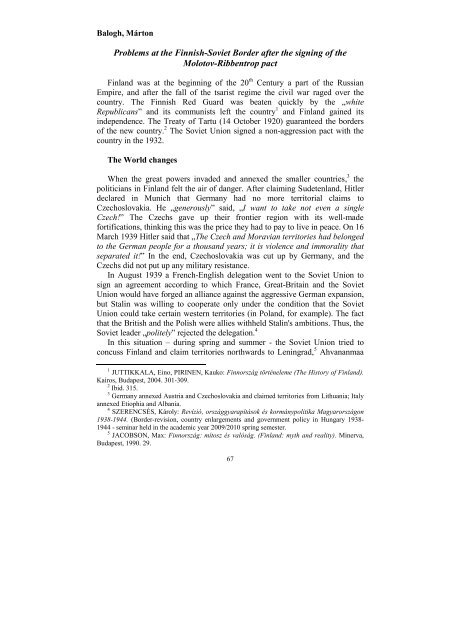The Molotov-Ribbentrop Pact - ELTE BTK Történelem Szakos Portál
The Molotov-Ribbentrop Pact - ELTE BTK Történelem Szakos Portál
The Molotov-Ribbentrop Pact - ELTE BTK Történelem Szakos Portál
Create successful ePaper yourself
Turn your PDF publications into a flip-book with our unique Google optimized e-Paper software.
Balogh, Márton<br />
Problems at the Finnish-Soviet Border after the signing of the<br />
<strong>Molotov</strong>-<strong>Ribbentrop</strong> pact<br />
Finland was at the beginning of the 20 th Century a part of the Russian<br />
Empire, and after the fall of the tsarist regime the civil war raged over the<br />
country. <strong>The</strong> Finnish Red Guard was beaten quickly by the „white<br />
Republicans” and its communists left the country 1 and Finland gained its<br />
independence. <strong>The</strong> Treaty of Tartu (14 October 1920) guaranteed the borders<br />
of the new country. 2 <strong>The</strong> Soviet Union signed a non-aggression pact with the<br />
country in the 1932.<br />
<strong>The</strong> World changes<br />
When the great powers invaded and annexed the smaller countries, 3 the<br />
politicians in Finland felt the air of danger. After claiming Sudetenland, Hitler<br />
declared in Munich that Germany had no more territorial claims to<br />
Czechoslovakia. He „generously” said, „I want to take not even a single<br />
Czech!” <strong>The</strong> Czechs gave up their frontier region with its well-made<br />
fortifications, thinking this was the price they had to pay to live in peace. On 16<br />
March 1939 Hitler said that „<strong>The</strong> Czech and Moravian territories had belonged<br />
to the German people for a thousand years; it is violence and immorality that<br />
separated it!” In the end, Czechoslovakia was cut up by Germany, and the<br />
Czechs did not put up any military resistance.<br />
In August 1939 a French-English delegation went to the Soviet Union to<br />
sign an agreement according to which France, Great-Britain and the Soviet<br />
Union would have forged an alliance against the aggressive German expansion,<br />
but Stalin was willing to cooperate only under the condition that the Soviet<br />
Union could take certain western territories (in Poland, for example). <strong>The</strong> fact<br />
that the British and the Polish were allies withheld Stalin's ambitions. Thus, the<br />
Soviet leader „politely” rejected the delegation. 4<br />
In this situation – during spring and summer - the Soviet Union tried to<br />
concuss Finland and claim territories northwards to Leningrad, 5 Ahvananmaa<br />
1<br />
JUTTIKKALA, Eino, PIRINEN, Kauko: Finnország történeleme (<strong>The</strong> History of Finland).<br />
Kairos, Budapest, 2004. 301-309.<br />
2<br />
Ibid. 315.<br />
3<br />
Germany annexed Austria and Czechoslovakia and claimed territories from Lithuania; Italy<br />
annexed Etiophia and Albania.<br />
4<br />
SZERENCSÉS, Károly: Revízió, országgyarapítások és kormánypolitika Magyarországon<br />
1938-1944. (Border-revision, country enlargements and government policy in Hungary 1938-<br />
1944 - seminar held in the academic year 2009/2010 spring semester.<br />
5<br />
JACOBSON, Max: Finnország: mítosz és valóság. (Finland: myth and reality). Minerva,<br />
Budapest, 1990. 29.<br />
67













